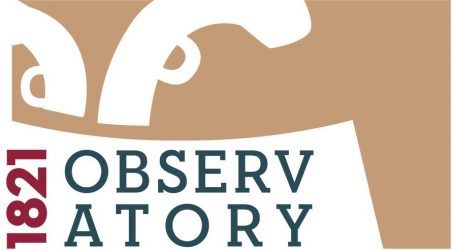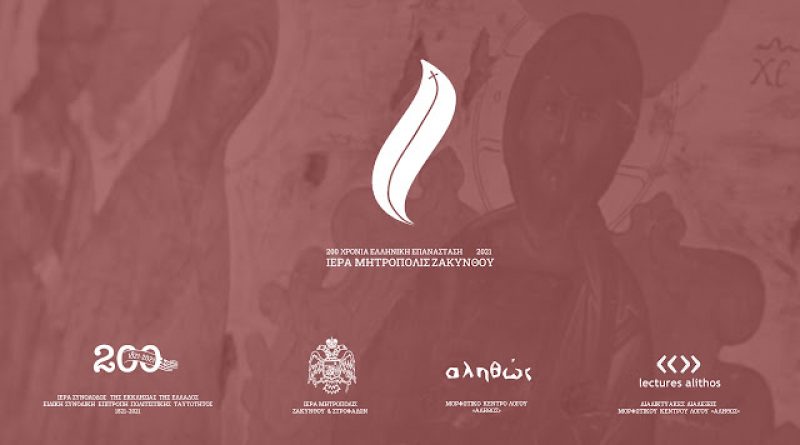A series of lectures by the Holy Metropolis of Zakynthos marking the bicentenary of the Greek Revolution, with a special reference to the work of the Zakynthian historian and writer Dinos Konomos
The Church of Greece, through the Holy Synod, the holy metropolises and its organisations, has contributed to the bicentenary of the 1821 Revolution with academic conferences, workshops, publications, speeches and lectures, student competitions, radio shows and other events throughout the country.
Among the events hosted by the metropolises, the series of online lectures organised by the Holy Metropolis of Zakynthos, in collaboration with the Alithos centre of the Parish of Vanato, stood out. At the urging of the metropolitan, Dionysios IV, eight lectures were held from 15 March to 19 April 2021. As mentioned in the announcements of the metropolis, the aim of the events was to underline the special contribution of the local church to the Greek independence struggle, but also to illuminate unknown aspects of local history by highlighting people who played an important role in the revolution. The lectures were attended by prominent personalities of the local clergy and community as well as by representatives of the Ecumenical Patriarchate.
The topics were varied. Among others, the contribution of monasteries to the revolution was emphasised, as they maintained the flame of the revolution, awakened the downtrodden Greeks and were the safest sources of writings and the protection and care of the sick. The monasteries were also meeting places of the Greek revolutionaries and contributed not only spiritually but also materially to the independence struggle. Mention was also made to the important work of Dionysios Solomos of Zakynthos and to the echo that the poems of the national poet have to this day in the souls of the Greeks. For this reason, Panagiotis Kapodistrias, archpresbyter of the Ecumenical Patriarchate, characterised Solomos in his lecture as a “timeless firebrand”. However, apart from Solomos, the series dealt with the life and work of other important personalities of Zakynthos, such as the Ecumenical Patriarch Grigorios V. The patriarch had become a monk in the Monastery of Strofades of Zakynthos, and in his honour the current monks of the monastery honoured him as a holy hieromartyr in a service held on 11 April 2021.
The lecture topics also included the new martyrs who actively participated in the revolution and sacrificed themselves because they refused to convert. Such was the 18-year-old new martyr Theofilos, originally from Zakynthos. Also mentioned were the refugees from Epirus, silversmiths by profession, who were forced to take refuge in Zakynthos during Ottoman rule, but gradually contributed to the economic development of the island.
Another lecture focused on the Church of Agios Georgios of the Latinos family as an important centre of the Philiki Etaireia in Zakynthos. The church was the sacred place where the members of the Philiki Etaireia were sworn in, contact between the fighters established were made and ammunition was collected.
Special mention was made of the public sculptures of Zakynthos, which are characterised as “arks” for the preservation of memory and national ideology. The last lecture of the series was a small tribute to the work of the local historian and writer Dinos Konomos (1918–1990), who managed to collect “pieces of memory” on the activities of various local heroes of Zakynthos during the revolution,[1] thus contributing to the preservation of local history and memory.
From 1944 to 1992, he wrote 66 independent works, many of which referred to events of the revolution[2] as well as to the political history of Zakynthos of that period.[3] He was was the founder and director of the journal Eptanisiaka Fylla, 16 volumes of which were published in his lifetime. A lover of the “Hymn to Liberty” by Dionysios Solomos, he dedicated several studies to the national poet.[4]
However, apart from Solomos, Konomos dedicated his studies to another great personality of Zakynthos: the historian, politician, lawyer and 1821 activist Georgios Tertsetis. A large part of Tertsetis’ studies was destroyed by the great fire that broke out in Zakynthos in August 1953 following a catastrophic earthquake. Konomos managed to collect unpublished texts of the great politician and publish them in a consolidated study,[5] which remains a valuable tool for researchers studying the period from the proclamation of the revolution to the founding of the first Greek state.[6]
The rich themes of the lectures organised by the Metropolis of Zakynthos served to illuminate the active role of the churches and monasteries of Zakynthos in the revolution and the action of the priests and the New Martyrs of the region. They also highlighted the contribution of Dinos Konomos to the spiritual tradition of the island. Zakynthos did not experience Ottoman rule; however its participation in the struggle was valuable. It hosted the Philiki Etaireia and the people it nurtured, such as Dionysios Solomos, Patriarch Grigorios V and the refugees from Epirus, contributed to the economic and mainly to the spiritual development of the island.
Vasiliki Filiou, PhD candidate in modern and contemporary history at the Department of History and Ethnology, Democritus University of Thrace
[1] Dinos Konomos, Ο Διονύσιος Ρώμας και η ελληνική εθνεγερσία [Dionysios Romas and the Greek national uprising] (Athens: s.n., 1972).
[2] Dinos Konomos, Μυστικές εταιρείες στα χρόνια της εθνεγερσίας [Secret Societies in the years of the National Uprising] (Athens: s.n., 1973)
[3] Dinos Konomos, Ζάκυνθος. Πεντακόσια Χρόνια 1478-1978 [Zakynthos: five hundred years, 1478-1978], vol. 3, pt. 3, Πολιτική Ιστορία 1815-1864 [Political history 1815-1864] (Athens: s.n., 1985).
[4] Dinos Konomos, Σολωμού ανέκδοτα γράμματα στον Ιωάννη Γαλβάνη [Unpublished letters from Solomos to Ioannis Galvanis] (Athens: Institut français d’Athenes, 1950) and Konomos, Σολωμικά [Solomika] (Athens: s.n., 1963).
[5] Dinos Konomos, Γεώργιος Τερτσέτης: Ανέκδοτα κείμενα [Georgios Tertsetis: Unpublished texts] (Athens: s.n., 1959).
[6] Some of Tertsetis’ studies have been published by the Greek Parliament: Ο Γεώργιος Τερτσέτης και τα ευρισκόμενα έργα του [Georgios Tertsetis and his works] (Athens: Library of the Hellenic Parliament, 1984). Also available online: https://www.hellenicparliament.gr/onlinePublishing/TER/index.htm.

